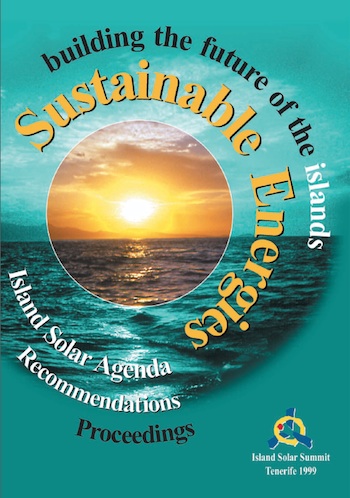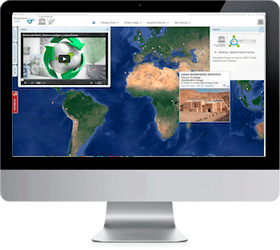Sustainable Energies – Building the future of the islands.
Download Proceedings PDF (9.7 MB) →
By Federico Mayor Zaragoza
Organising the Island Solar Summit, in collaboration with UNESCO, INSULA and the World Solar Programme 1996-2005, was a magnificent and timely initiative of the Tenerife Cabildo,ITERandthe Canary Island Government that willmakea valuable contribution to the on-going discussion on the future of island societies.
After the United Nations Conference on the Environment and Development, held in Rio de Janeiro in1992,UNESCOorganised a meeting of high level experts called “The Sun at the Service of Mankind”. The objective of the meeting was to study how to increase the use of solar energy and other renewable energies, in the interests of economic and social development andthe protection of the environment. In compliance with the recommendations of this meeting,UNESCO spent three years preparing the organisation of a World Solar Summit to provide a political stimulation from Heads of State and Government, to enhance the dissemination ofrenewableenergies.HeldinHarare, Zimbabwe, in September 1996, this Summit approved a Declarationon Solar Energy and Sustainable Development and initiated the preparation of the World Solar Programme 1996-2005, which was approved in June 1997. A World Solar Commission, chaired by H.E. Robert G. Mugabe, President of the Republic of Zimbabwe, andmadeupof 18 Heads of State and Government, including His Majesty King Juan Carlos I, provides direction and supervises the implementation of the Programme.
The use of renewable energies has two main facets: social and economic development on the one hand, and protection of the environment on the other. On the threshold of the third millennium, there are still 2.4 billion human beings with no access to basic energy services, more specifically electricity. This means that they have no chance of education, health, communication, drinking water supply or any of the other services that are necessary these days for a decent quality of life. Concerning the environment, for the first time, the Rio Conference recognised the risk of climate change caused by the emission of gases produced from consuming fossil fuels.T heConference also highlighted that a greater use of renewable energies is one of the basic factors required for mankind to adopt an ewand sustainable energy strategy.
As islands do not have fossil resources, they are highly dependent on the exterior for their energy, which is a burden on their gross domestic product and a constraint on their development. The fragile and vulnerable nature of island environmentsmeanthat importing inappropriate energy models also represents a serious risk to island environments, their most valuable asset. Ont he other hand, they generally have an abundance of available renewable energy sources that would make it possible to install decentralised, stand alone and clean energy systems. To this end, in the United Nations Global Conference on Sustainable Development of Small Island Developing States(Barbados1994) and in successive developments, especially the case of the Island Agenda for Sustainable Development (Minorca 1997), the strategy of maximum use of renewable energy sources appears as an essential challenge for island societies. In fact, because of their special characteristics, island territories are one of the most privileged habitats, where the option of renewables becomes, in most cases, the only rational solution. Places,that will almost certainly become the gateway for the solar solution in the next millennium.
Of course, a greater spread of the pertinent technologies requires competent personnel and palpable and specific demonstration actions todetermine which are the most suitable in each case. This explains the important role of educating and training engineers and technicians in the area of renewable energies. The experience of ITER as an international centre for harnessing and investigating renewable energies in an island setting, is a practical example to be followed by efficient network based on the exchange and transfer of technology, information, advice and training, a priority need for islands in this particular moment.
Energy sustainability in islands today is not a uto- pia, it could said that it constitutes a condition for consolidating their balanced development. Today’s technology is able to permit the bringing together of a great alliance in favour of renewable energies and energy efficiency in insular territories. For this reason, this summit has been an important step in the construction of a common future of co-operation to assure the conservation of resources and development of distinct insular economies. An essential step for a promising tomorrow that we will be able to feel proud of.
















